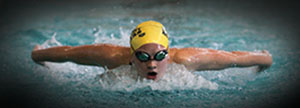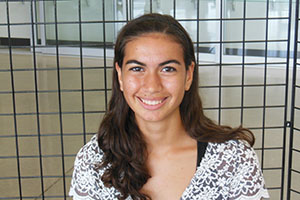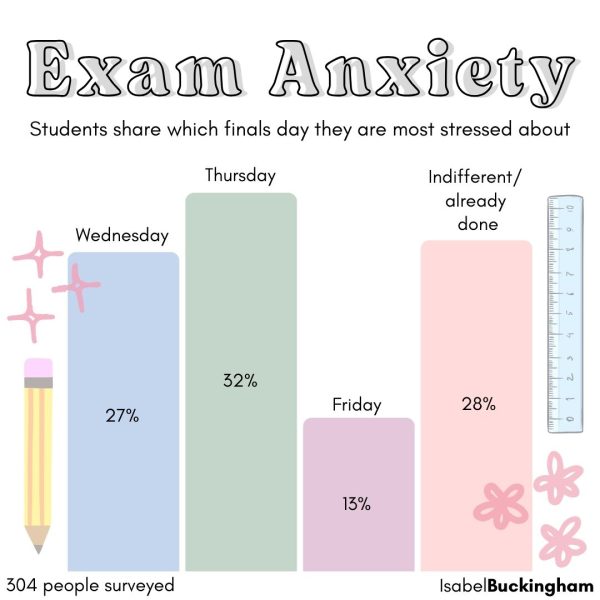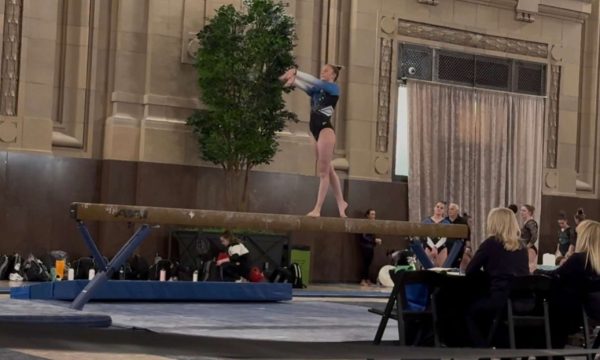Why students athletes play through injuries

Two years ago, junior Isabelle Finzen fell after swinging from the ceiling in her basement and broke both of her arms. He first thought was what would happen to her ability to swim.
“I was really concerned with how I would make a comeback, or if I would be able to swim at all, or if the swim meet I was trying to get to was even in the cards anymore,” Finzen said. “[I was worried] after a stupid mistake like that, I’d ruin my entire future and setting up for colleges.”
According to a 2013 study conducted by the NCAA, fewer than 10 percent of high school athletes will continue to play in college. Although some people argue that “it’s just high school,” it’s not uncommon for student athletes such as Finzen to find a strong enough motive to play through injuries.
Finzen was used to waking up at 4:30 for practice, and returning again immediately after school. She saw her swim team more than her family. Swimming was “what she lived for.”
“After I broke my arms, I told [my mom] I was 100 percent fine and I could still swim through it,” she said. “During my swim practices, if a set gets really hard, I always am like, ‘if I hadn’t been so stupid freshman year, I probably would’ve been able to make these.’ I knew I had been training so hard for years, and how was I supposed to make that up in a few months? I always have regrets about it, but now I’m at a stage where I know I couldn’t have done anything. I’m at the point where I just train harder to make up what [I] lost.”
Over the course of a year, Isabelle broke a bone on every limb, but she did everything in her power to keep practicing. When she had a broken ankle, Finzen would take off her ankle brace and do flip turns with one foot. After she broke her arms, she attempted twice to swim with plastic casts on both arms.
“It looked like I was flailing and convulsing, and coach was like, ‘you’ve gotta get out,’” she said. “But I just couldn’t stay out of the water. It made me anxious and stressed that I couldn’t get in.”
Unfortunately, this is the a common mindset and a cause of many injuries. According to stopsportsinjuries.org, overuse injuries can happen when people “try to make up for lost time by pushing themselves to achieve the level of participation they were at before injury” when they begin playing again. They are also more likely to occur in athletes who play the same sport year-round, which is not recommended because it can be physically and mentally draining.
Junior Tristan Eastham is a year-round distance runner. He won State in cross-country and was hoping to qualify for State in the mile and two-mile during track the following spring, but he suffered from a muscle detachment in his hip early on in the season. His doctor said he could run through it if he thought he could handle it, and his parents were supportive of the decision he wanted to make. He never missed a race during the regular season.
“I think that’s just my own expectations for myself to be at every race and give it everything I could, no matter what the circumstances,” Eastham said. “The races just weren’t coming through because I was hurt, which was frustrating because it was like I couldn’t go any harder, but [I] should be.”
However, at Regionals, the injury reached the point where his coach had to ask him to drop out of the two-mile, since he’d already qualified for State in the mile.
“If there was any kind of outside pressure, it was more of me thinking other people thought that I should be doing that,” Eastham said. “I usually think that [I should be] trying to please other people when maybe I shouldn’t be.”
Eastham says the boys on the team hold each other to the high expectation that they will work as hard as they can to their fullest ability, no matter what.
“There’s no ‘ifs’ ‘ands’ or ‘buts’ — you’ve just got to show up and do it,” he said. “[If someone’s injured] we don’t really talk about it — usually it’s kind of more you know that person is hurt, so don’t bring it up, just kind of keep them going and make sure they stay focused and they’re not using it as an excuse.”
Unfortunately, some injuries can have serious long-term consequences, especially for high school athletes. For example, medicalnewstoday.com stated in 2013 that adolescants are more vulnerable than adults or children to sport-related concussions.
 Senior Cody DeMoss has had six concussions in his lifetime, including two from high school football and three from high school wrestling. In March of this year he had to visit the KU Hospital for one of them, and while he passed enough memory tests, his doctor advised him to not play anymore.
Senior Cody DeMoss has had six concussions in his lifetime, including two from high school football and three from high school wrestling. In March of this year he had to visit the KU Hospital for one of them, and while he passed enough memory tests, his doctor advised him to not play anymore.
“My mom does not want me to play sports, but my dad wants me to get a scholarship for football,” he said. “He knows the consequences of me getting a concussion, but he wants me to push through it, which I agree with. It’s my decision.”
Although DeMoss is taking extra precautions to wear special headgear and avoid using the crown of his head when playing, he is still has a high risk potential. “Contemporary Pediatrics” recommends that after a concussion, it is important to refrain from “cognitive activities (including cell phone texting, television viewing, loud music and computer) and physical activity that may exacerbate symptoms,” but these are activities that occur on a daily basis for a teenager.
Both adolescents, whose brains are still developing, and athletes who have had concussions before take longer to recover, and there is an increased risk for another concussion after the first one, according to the CDC. A single concussion affects a person’s working memory and the ability to focus and sustain attention, and the effects can last up to a year.
DeMoss scored lower in some areas, such as problem solving, that he hadn’t tested low in before. His friends say that he is more forgetful, and he feels like he is worse in math and has more trouble concentrating. He has a higher risk of getting dementia and alzheimer’s. If he gets a serious concussion, he could be left paralyzed, or the results could even be fatal.
“It is a risk, but I feel like the reward outweighs the risk,” DeMoss said. “I really want to get a scholarship to play football, and my education would be paid for. It would just be a lot easier. [And] since I’ve played all the way through my high school career in both sports, I didn’t want to let my team down…I don’t want to let my school down or my community down.”
The majority of Demoss’s friends don’t want him to take the risk of playing, but he said he can’t play football forever, so he wants to be able to remember playing his senior year.
“I just love playing sports,” DeMoss said. “I’ve played them all my life, and I just feel like if I stop playing, I wouldn’t be as happy as I am if I was. I wouldn’t be myself if I didn’t play.”
Editor’s note: On Oct. 10, DeMoss suffered from his seventh concussion at the football game against Bishop Miege. DeMoss continued playing until halftime, but has since been told by his doctor that he can longer participate in high school sports.

2014 marks Ananda Bhatia's third year in newspaper and first year as editor-in-chief. She is incredibly excited to work with such a talented and hard-working...




